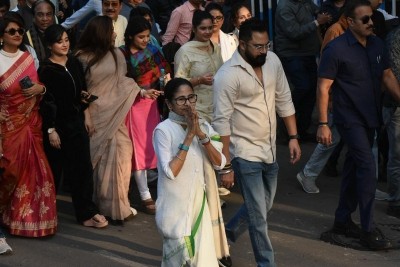 Kashmir
Kashmir
Sensor-based smart agriculture for Jammu and Kashmir farmers soon: ACS Dulloo
Jammu: Stating that over 70 percent of the economy in Jammu and Kashmir is based on agriculture, making it an important area for improving livelihoods through the adoption of digital agriculture for increasing input use efficiency, production, productivity, and profitability, the proposal for sensor-based smart agriculture can be a transformative innovation for the region's agri-economy, said Atal Dulloo, Financial Commissioner (Additional Chief Secretary), Agricultural Production Department here on Friday.
Dulloo said that the world's population is growing at an unprecedented rate, and as a result, food production must keep pace with this expansion, adding, "this has put immense pressure on the agricultural industry to increase productivity and output. Agriculture, which contributes over 17 percent to India's GDP, employs over 54 percent of the country's population."
"Traditional agricultural practices are labor and input intensive, less remunerative, and sensitive to weather changes. The young educated youth are leaving agriculture because of low returns, uncertainty, and drudgery. The incorporation of technology, particularly AI and IoT, into agriculture has the potential to address challenges such as low efficiency, profitability, and competitiveness," he said further stating that this could lead to a more attractive and professional image for the industry.
Dulloo said, "a sensor-based pilot study will be conducted on high-density apple orchards, protected cultivation, and smart livestock farming with an objective to increase the use of resources and improve efficiency by up to 80 percent and automate agricultural operations with precision in HDPs of Apple, vegetables, and livestock."
"The use of AI-based detection of pests and diseases using handheld sensor devices can significantly reduce the drudgery and cost of cultivation by 20 percent. The proposal also aims to develop algorithms for big data analytics for remote operations of IoTs and create a startup ecosystem in smart agriculture by networking with IITs and industries," he added.
He further said that the certificate and diploma courses in AI and ML, IoT, and automation, and Blockchain technology will be launched to train skilled manpower for the new skillsets required in the industry.
“The outcome of the proposal will be 50-80 percent increase in resource use efficiency, the development of a sensor-based grading and sorting system of apple, and the development of a decision support system (DSS) for pest and disease management," said Dulloo adding that the real-time detection and variable rate spray using robotics and drones will reduce the production cost by 80 percent.
"The proposal also aims to build a sensor corridor for livestock and phenotyping and yield prediction,” said the ACS further adding that the trained manpower, consisting of graduates, certificate and diploma holders in IOT, AI and ML fields will form a new startup culture in the sensor-based agriculture system.
The project is one among the 29 projects, which were approved by the Jammu and Kashmir administration after being recommended by the UT Level Apex Committee for holistic development of Agriculture and Allied Sectors in UT of J&K, he revealed.
"Having a total outlay of Rs. 30.40 crore the project on Sensor based Smart Agriculture aims to integrate agriculture with technology driven by AI and IoT for automation of practices, increasing resource use efficiency, and profitability," he said adding that hi-tech polyhouses can be used for cultivation of cash crops around the year with the application of IoT and automation for monitoring microclimatic parameters of plants.
"The green house technology can result in increased yields from 2 to 4 times and also make possible offseason availability of vegetables as early production or late availability as compared to open field conditions.
Livestock rearing is currently done in poor environmental shelter, so there is a need for a sensor-based monitoring system for shed environment and an auto-management system for tagging of animals for identification," said Dulloo.
He stated that the thermal and pedosensors based heat detection and IoT-based sensors can be used for phenotyping and health management and yield prediction of livestock.
"Digital transformation in agriculture is one of the potential areas to mitigate the challenge of increasing output by 60 percent by 2040 to match the ever-growing population, " the ACS disclosed.
He asserted that the investment in Agri-Tech reached $4.6 billion in 2015, with recent studies showing that the sector's growth is inevitable.
However, there are still challenges that need to be addressed to ensure that digital transformation can make a significant impact in agriculture.
One of the primary obstacles is the lack of access to technology and digital infrastructure in many rural areas, which is a crucial problem that needs to be addressed.
"To overcome this issue, governments and private organizations must work together to provide affordable access to digital technology and infrastructure in rural areas. The development of smart villages can act as a catalyst for the overall development of the agricultural sector," said Dulloo.
He said that by providing farmers with access to the latest technologies and digital infrastructure, they can optimize their production and increase their yields and profitability while the Government of India has launched several initiatives such as the Digital Agriculture Mission, which aims to provide digital infrastructure across all the 600,000 villages in the country.
Additionally, he said that there is a need for extensive training and education for farmers to enable them to understand the technology and use it to maximize yields and profits.
"The adoption of digital technologies can help farmers make data-driven decisions and improve their farming practices. The government of Jammu and Kashmir has proposed the launch of certificate and diploma courses in AI and ML, IoT, and automation, and Blockchain technology to train skilled manpower for the new skillsets required in the industry," Dulloo said and added, "another significant challenge is the high cost of technology, which may be a barrier for small-scale farmers." Governments and organizations need to invest in research and development of affordable and practical technologies that can help small-scale farmers to optimize their production, he said.
Dulloo further added that the implementation of government schemes such as the Pradhan Mantri Fasal Bima Yojana and the Kisan Credit Card scheme can provide financial assistance to farmers for the purchase of equipment and technologies.
In conclusion, digital transformation in agriculture has the potential to revolutionize the way food is produced, but it requires a concerted effort from governments, private organizations, and farmers to make it a reality, he mentioned.
"By addressing the challenges associated with the implementation of digital technology in agriculture, we can help to ensure that we can meet the growing demand for food in the years to come," said the ACS adding that the government of Jammu and Kashmir's proposal for a sensor-based smart agriculture ecosystem can be a game-changer for the agri-economy of the region.
"The integration of agriculture with technology driven by AI and IoT can make agriculture glamorous, professional, and competitive," he maintained.
(With UNI inputs)
Support Our Journalism
We cannot do without you.. your contribution supports unbiased journalism
IBNS is not driven by any ism- not wokeism, not racism, not skewed secularism, not hyper right-wing or left liberal ideals, nor by any hardline religious beliefs or hyper nationalism. We want to serve you good old objective news, as they are. We do not judge or preach. We let people decide for themselves. We only try to present factual and well-sourced news.







